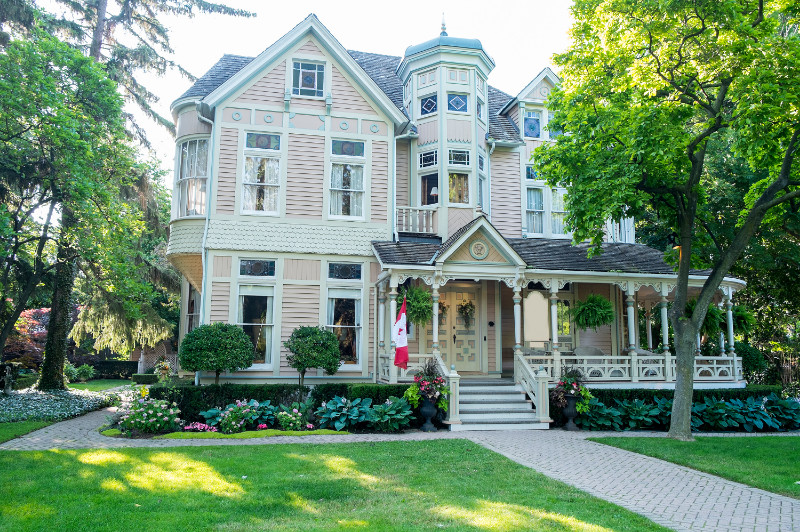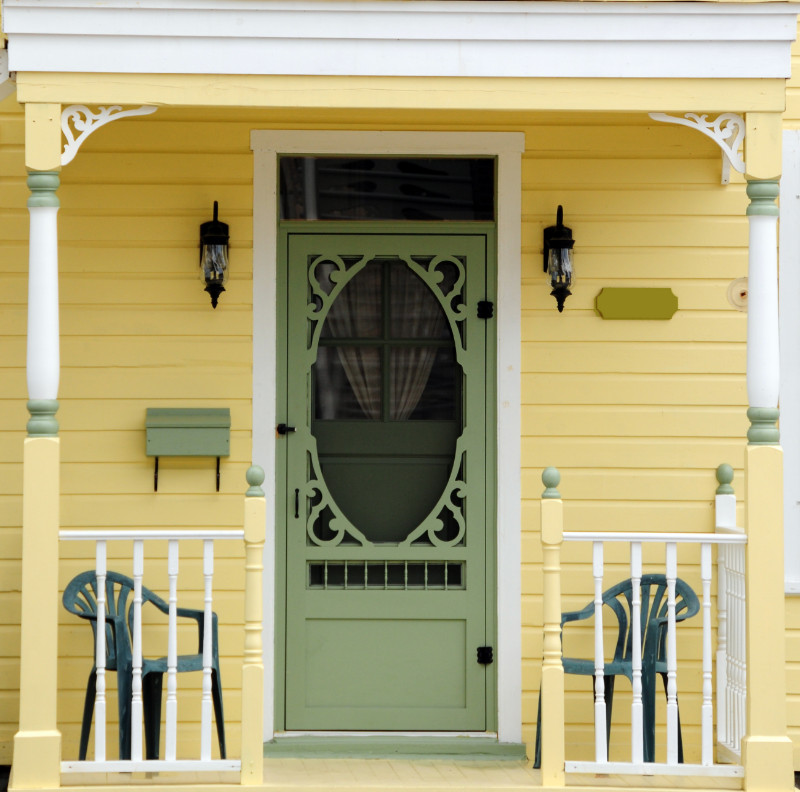
Ontario is rich in heritage homes that say a lot about the region’s history and culture. Heritage homes (a.k.a. historic homes) are unique real estate properties that entail more considerations when it comes to their purchase, sale, upkeep and/or renovation. That said, buying a historic home doesn’t have to be overwhelming – the key is knowing what you are getting into before you move forward with your plans.
WHAT IS A HERITAGE OR HISTORIC HOME?
Heritage homes are residential properties designated by the government as having “special heritage interest,” a term that means the property has been deemed as adding history, charm, aesthetic, or cultural value to a community. Several factors determine if a property can be given heritage status, including:
- Age of the home
- Historical significance
- Architectural design and builder
- Method of construction
- Cultural value
- Previous owners
The Ontario Heritage Act defines how a property can be identified and designated as a heritage property, while also detailing how they should be protected and conserved. The Act also empowers municipal governments to designate heritage properties and districts.
When a property has been classified as a heritage home, any change or renovation must first be approved by a committee to ensure the property’s intrinsic value is not affected. Certain heritage properties are also protected from demolition.
Valuation of a heritage home
There is a widespread notion that a heritage designation can negatively impact the value of a property, but research shows this is not the case. In fact, the opposite is often true. According to the International Journal of Heritage Studies, the rate of sale among heritage homes is ”as good or better than the ambient market trends,” adding that heritage homes “tend to be resistant to downturns in the general market.”
One report that surveyed 24 Ontario communities discovered the following facts about heritage homes:
- 74% of heritage homes performed average or better than average in the market
- 59% of heritage homes performed better than the average property
- 15% of heritage homes performed just as well as regular homes in a given area
- The highest selling historic homes sold 88% to 92% better than the average property
These and other studies strongly suggest that a heritage designation can boost a property’s value, especially when compared to that of average properties.
6 FACTS BUYERS NEED TO KNOW ABOUT HERITAGE HOMES

Buying a historic home can be extremely rewarding, but it’s not for everyone. Owning a historic home is a privilege and a way of honoring what came before. Therefore, it’s important for a heritage property to mean something to you before you spend money on it. Get to know the qualities that make the property unique or historical, and then be willing to preserve and protect them, even if it means spending a little more for maintenance and renovation.
Here are six major things you need to know about buying a historic home before you start shopping for one.
- Confirm the home’s heritage designation
The surest way to confirm the type of heritage property you’re looking at (whether you’re buying a heritage-listed property, designated heritage property, or part of a heritage district) is to check the local municipal register, which records the properties in the area deemed to be historically valuable. The register will also contain other important information related to the property, including a statement detailing its heritage value and historical attributes.
Buying a heritage-listed property will have different restrictions from that of a heritage designated property and properties belonging to a heritage district. A knowledgeable heritage property agent will be a good resource to familiarize yourself with the different restrictions for each heritage property type.
- It’s costlier to maintain a heritage home
Buying a historic home doesn’t mean you have to live with obsolete home features that sacrifice your comfort and convenience. Keep in mind that heritage homes are often more than a few decades old, which makes them less easy to maintain. Depending on when the property was last updated, the electrical, HVAC, and plumbing systems may require upgrades.
Be sure to conduct due diligence and hire a certified home inspector so you can get a sense of the structure’s overall condition. It’s important to remember that certain terms and conditions of heritage home ownership could severely limit your ability to make improvements, which can lead to longer and more complex renovations.
For instance, if the stained glass windows have worn or cracked frames that offer little protection against the winter air, you may be tempted to replace them with modern glazed windows. However, existing restrictions may not allow for their replacement, or your new windows should look exactly like the original stained glass windows, using the same materials and method of construction. If you’ve hired a real estate agent who specializes in heritage homes, consult for options.
- Processing heritage homes takes time
With all the permits, regulations, and restrictions that come with heritage homes, buying one takes a longer time. Repairs will require approvals from relevant authorities. Once your plans are approved, you will need to find a contractor who has worked on heritage homes and who will often charge more for their expertise.
After the work is done, it will need to be reviewed by a local board or government association to ensure that it complies with guidelines and approved plans.. If you conduct renovations without permission or fail to comply with relevant regulations, you could face penalties and worse, lose ownership of the house.
These are the reasons you need to respect the integrity and significance of a heritage home. Without due respect, you will fail to see the heritage home for the treasure that it is and managing it will feel more like a chore than an honor.
- Heritage homes can qualify for financial assistance and tax relief

Some heritage properties are eligible for a grant or loan funding, which will help reduce the cost of ownership. The local heritage authority will be a good resource for knowing if the heritage property you’re interested in qualifies for any sort of financial assistance from certain government agencies, non-profit organizations, and/or other special entities.
Owners of heritage properties may also qualify for tax credits. To encourage heritage preservation, the Canadian government currently offers four kinds of tax relief for heritage homes, including property tax abatements, property tax credits, property tax relief, and sales tax grants and rebates.
- Heritage homes can be insured
Not a few heritage homeowners have been told by their insurance providers that their heritage property cannot be insured. If you’re interested in buying a historic home, you should know that insurance is available for them as long as their features comply with modern safety and living standards. Confirm this with the seller while conducting your due diligence on the property. It is important to remember that a home that costs more to repair and maintain will also have higher insurance premiums.
Use the tips below to find the best insurance policy for your heritage property.
-
Compare quotes. Shop around and get quotes from a few providers for the same amount of coverage. Make sure the insurer you choose understands the unique qualities of a heritage property and the risks associated with it.
-
Reduce risk. Many insurance companies will lower your rate if you take steps to enhance your property’s safety and protection. Installing smoke detectors and burglar alarms, and updating your roofing, HVAC, and plumbing systems are just some of the ways you can reduce your risks, along with your premiums.
-
Have all the necessary paperwork. When your documents are complete, your approval will come much sooner. Some of the documents you should secure prior to applying for insurance include:
- Documents related to zoning, construction, repair and/or demolition of your property
- Documents identifying the property’s heritage classification
- Documents related to the region’s existing plans for heritage properties
- Repair and renovation records (including exteriors, interiors, and outbuildings)
- Heritage Property Risk Prospectus
-
Catalog the property’s unique features. Masonry, dutch doors, timber frames, hand-carved columns, antique chandeliers – you’ll need to record and photograph the features that set your heritage property apart. Provide these records to your insurer so they can properly estimate the cost of restoration in the event of a loss.
-
Ensure adequate coverage. It falls on you as the new owner to ensure your coverage meets heritage regulations while reflecting the true value of your property. Don’t reduce coverage just to save on premiums – you might come to regret it later.
-
- Heritage homes retain their resale value
Should you decide to sell in the future, you’ll be glad to know that your heritage home retains or even increases in value over time. This is especially true for properties that possess features considered to be historically important. Specific artisanal details, rare architectural features, and construction materials can be hard to come by in modern homes, which can help make a heritage home highly sought after.
THE NEED TO WORK WITH AN EXPERIENCED HERITAGE HOME AGENT
As you can see, buying historic homes entails unique demands. Therefore, not all real estate agents will have the knowledge and experience to represent such properties. It’s important to work with a professional with a solid reputation for dealing in heritage properties. These specialists will provide you with expert assistance and advice during negotiations and processes. They will also know how to work within set restrictions to ensure you get the most out of your investment.
Heritage properties by the Krishan Nathan Group
The Krishan Nathan Group provides quality real estate services for those looking to buy heritage properties in CFB Kingston and the surrounding areas. Take a look at some of the heritage properties we have on our listings.
https://ngroup.ca/homes-for-sale-details/428-PRINCESS-STREET-KINGSTON-ON-K7L-1C2/40417566/273/
WORK WITH THE KRISHAN NATHAN GROUP TODAY
If you’re interested in buying a historic home in CFB Kingston, contact the Krishan Nathan Group today. We understand the complexities of buying heritage homes and we are here to help you plan and strategize to ensure you get the most from your investment.
If you have any questions about owning a historic home or buying a heritage listed property in Ontario, Canada, call 613.507.3711 or contact us here.


